
This is it: the day you’ve been waiting for all week. It’s time to reveal our picks for the best and worst films of 2013. [Read more…]
The curated portfolio of film journalist Joe Lipsett

This is it: the day you’ve been waiting for all week. It’s time to reveal our picks for the best and worst films of 2013. [Read more…]

Welcome to the third annual Bitch Awards, celebrating the best and worst films and TV of the year. Stick around for the next two weeks as we raise a glass to our favourite works from 2013 (and duck as we unceremoniously throw the remote at our least favourites).
We’re almost at the top of our list of best and worst. Check out the films that come in at number two.
WORST
TVAngie
#5: The World’s End (Wright, 2013)
#4: Upstream Color (Carruth, 2013)
#3: Passion (De Palma, 2012)
#2: The Mortal Instruments: City of Bones (Zwart, 2013)
I don’t know why I keep watching these YA/tween-book adaptations, but I suppose the romantic in me hopes that one of them will actually turn out to be decent. Unfortunately, even with an all-star cast that includes Lena Headey, CCH Pounder, Jonathan Rhys Meyers and Jared frickin’ Harris, The Mortal Instruments: City of Bones is a dud.
The film follows young pouty-lipped Clary (Lily Collins) as she discovers she’s a shadow-hunter, a kind of particularly gifted warrior who helps to rid the world of demons walking amongst us. Her love interest and heartthrob guide is Jace (Jamie Campbell Bower) who, of course, shows up with long tousled hair, the right amount of guy-liner and an English-accent. Who could resist?
The performances on the whole aren’t that bad – although many of the adult actors are wasted since the focus is mainly on the angst-y teenagers. What’s really awful here is the script and the pacing: there’s no sense of urgency. Clary’s awakening begins once her mother, played by Headey, is abducted and the rest of the film is essentially the quest to find/rescue her. If Clary is so desperate to find her mother, who may very well be dead or near death, then why all the drawn-out interludes? The most grating is a yawn-worthy love triangle between herself, Jace and her long-time buddy, Simon (Robert Sheehan). In fact there are several instances of bizarre pacing that does the film no favours. Perhaps these are hold-overs from the novel, but if it’s going to be adapted to the big screen, some tightening up needed to occur.
The story also suffers from a lack of originality. We’ve already encountered Muggles vs. Wizards and Grimms vs. Wesens, so seeing gifted people battle demons that hide in plain sight to us ignorant humans feels pedestrian and repetitive. It’s been done before and done better.
But perhaps the most off-putting thing about this film is the revelation that SPOILER ALERT Jace is actually the brother of Clary (this is revealed after the two have shared a passionate make-out session and likely a dry-hump). I’m sure in a later book of the trilogy this will be cleared up as a hoax (for the love of god I hope it does) but in the film version, it’s vomit inducing. Incest?! Talk about a buzz kill that sullies the only reason hopeless romantics are attracted to this genre in the first place. What’s even worse is how the film decides to deal with this – as in it doesn’t dealt with AT ALL. Clearly, the film wasn’t intended as a stand-alone feature (a sequel had already been commissioned), meaning that you’d have to watch the entire trilogy (if it happens) for any kind of narrative resolution, or more likely shell out for the novels (since this first film bombed, we may never see the whole trilogy filmed).
I realize many of the film’s faults likely lie in its original source material, but the end result is the same: a crappy book yields a crappy film. If a film leaves me longing for the Twilight saga, then it rightfully deserves a place near the top of my worst list.
cinephilactic
#5: Hansel & Gretel: Witch Hunters (Wirkola, 2013) / G.I. Joe: Retaliation (Chu, 2013)
#4: Elysium (Blomkamp, 2013)
#3: The Bling Ring (Coppola, 2013)
#2: Oz the Great and Powerful (Raimi, 2013)
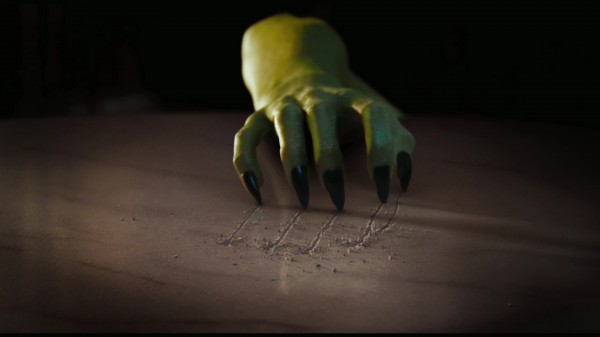
Courtesy of Walt Disney Pictures
Oh lord.
Sam Raimi has been in a rut for the last few years, so it’s no big surprise that his Disney-fied prequel to the Wizard Of Oz is a bastardization along the lines of Alice In Wonderland.
All of the goodwill James Franco earned in Spring Breakers is counteracted by this monstrosity, which fails to find anything meaningful to say about how a trio of witches became the cultural icons we know from Dorothy’s time in Oz. Not so spoiler alert: they’re basically just a bunch of foolish girls who tumble over themselves to impress a conman (Franco) who arrives in Oz in – what else? – a hot air balloon. One of the film’s main selling features is the mystery of which sister becomes the Wicked Witch, but viewers won’t have any problem figuring that out.
No one comes off well. Franco’s Oz is a sleazy playboy with a molustache (a molester mustache) whose entrance into the new world dictates the actions of every female for the remainder of the film. Rachel Weisz’s Evanora occasionally looks as though she’s having fun, but her character is so typically “Disney villain” that she’s little more than a crazed egomaniac in the climax. Mila Kunis fares worst as she has to play the (sexually) naive Theodora and is then promptly overshadowed by the green make-up and the history associated with the character. Her transformation scene is laughably done – a poor redux of Raimi’s better work in the Doctor Octopus scene in Spiderman 2.
Visually the film is a CGI monstrosity. A few examples, such as Joey King’s China Girl, are remarkable, but much of it is just a blur of ugly pixels that characters fail to interact with in a convincing fashion. This wouldn’t be a problem if the story was engaging, but it’s not. It’s a predictable bore, an insult to all viewers, even the children and families who comprise the film’s primary intended audience. In short, this film is not suitable for anyone – it’s the cinematic equivalent of “phoning it in” despite the obvious time – and money – spent on the visual effects. In Oz the Great and Powerful, no one comes out unscathed, especially audiences.
BEST
TVAngie
#5: The Book Thief (Percival, 2013)
#4: Gravity (Cuarón, 2013)
#3: The Act of Killing (Oppenheimer, Anonymous & Cynn, 2012)
#2: Prisoners (Villeneuve, 2013)
Prisoners is so high on my “Best” list not because it’s a flawless film, but because it stuck with me so long after I had watched it (a theme with this year’s picks). Canadian (woot) director Denis Villeneuve hasn’t disappointed me in the past with his breathtaking films Incendies (2010) and Polytechnique (2009), so I was anxious to see what his first English-language film would deliver. Much like his previous films, Prisoners makes you feel like someone sucker-punched you by the time the credits roll.
The film focuses on Keller Dover (Hugh Jackman) as he searches for his young daughter and her friend after they are abducted on Thanksgiving night, and concurrently, Detective Loki (Jake Gyllenhaal) who is tasked with finding the girls. Convinced that the police are doing nothing to find his daughter, Dover takes things into his own hands. He abducts and subsequently tortures Alex Jones (Paul Dano), a developmentally disabled man who likely saw the girls before they were abducted (or had a hand in abducting them himself – his role in the kidnappings is unclear). Here lies the film’s central quandary: is Dover justified in his brutal torture of Jones based on circumstantial evidence? I won’t spoil it for you, but the film forces you to wrestle with Dover’s actions and the fallout long after the film has ended.
What sells the film is its performances and direction – it’s clear that Villeneuve played a significant role in shaping what we end up seeing on screen. Jackman embraces the character wholeheartedly and is so convincing that I completely forgot about all his previous performances (goodbye Wolverine!). Every emotion is represented with an equal amount of intensity and commitment. Personally, I think it’s his best work by far. And Gyllenhaal, who played a similar role in Zodiac (2007), is an excellent counterpoint to Jackman. Viola Davis, Terrence Howard, Melissa Leo and Maria Bello all deliver superb supporting performances that elevate the film and contribute to its incredibly intense atmosphere. ‘Prisoners’ couldn’t be a more fitting title.
I should clarify that the film isn’t perfect, though. The plot meanders and could use some definite tightening, some things don’t quite make sense and the ending sequence should have been omitted entirely. But at the end of the day, this film is sure to get you thinking and talking and that’s a quality that is so rare nowadays. It’s likely not a film for everyone, but for me, it’s an incredibly memorable film and therefore earns a place on my best list.
cinephilactic
#5: Kon Tiki (Rønning & Sandberg, 2012)
#4: Jagten / The Hunt (Vinterberg, 2012)
#3: Spring Breakers (Korine, 2013)
#2: Stoker (Park, 2013)
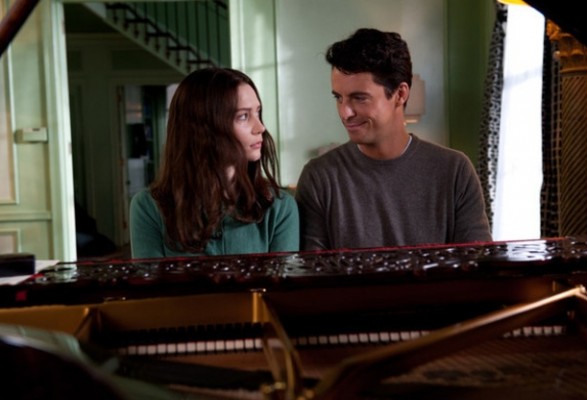
Courtesy of Fox Searchlight Pictures
Similar to TVAngie’s description of Prisoners above, Stoker is a difficult film to recommend since it’s not for everyone. I remember when I saw it earlier this year, the film studies scholar in me was in awe of the formal techniques on display (the mise en scene, costuming, editing, etc). Meanwhile, my poor tortured husband spent two hours wondering whether or not to kill himself to end his agony.
All of this to say that the film is not for everyone. As directed by Chan-wook Park (in his English language debut), Stoker is a psychosexual drama about an extremely dysfunctional family. The film is loosely based on Hitchcock’s classic, The Trouble With Harry, though the logline is surprisingly non-descript: a teenage girl, India (Mia Wasikowskaa), loses her father and on the day of the funeral, her potentially murderous uncle Charlie (Matthew Goode) moves in and begins to woo both her and her mother, Evelyn (Nicole Kidman). Both mother and daughter are sexually repressed so a significant part of the film is how Charlie manipulates and pits them against each other as the bodies begin to pile up. This is memorably captured in several piano duets which become infused with sexual tension and jealousy.
The reason this film is on my ‘Best Of’ list is because of the way Park tells the story. As written by Wentworth Miller (of Prison Break fame), the story itself is quite threadbare – low on dialogue and long on silences. Together with the basic dark framework, Park turns the tale into a dazzling visual masterpiece, filled with memorable tableaux that – if they weren’t so gruesome – you would hang on your wall. Very little of this is presented in a conventional fashion; Stoker is much more of an art film than a horrific family drama which will challenge audiences looking for a faster paced tale. And although nearly every scene is laced with eroticism, very little is overt – if viewers aren’t paying attention, it can become very easy to miss the layers of meaning conveyed in the set design and the staging and framing of actors and objects.
If you’re willing to take the time, Stoker is well worth the effort. It’s just not for everyone.
—-
We’re almost at the top! Tomorrow we reveal our absolute favourite films of the year, as well as the ones that made our eyes bleed. Be sure to join us in 24 hours to find out what we’ve chosen, and let us know what you think of our #2 picks in the comments below.
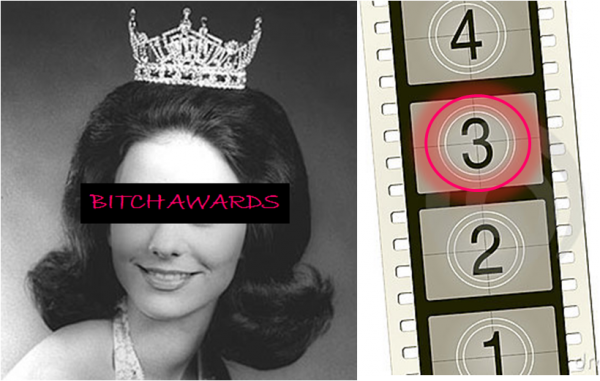
Welcome to the third annual Bitch Awards, celebrating the best and worst in film and TV of the year. Stick around for the next two weeks as we raise a glass to our favourite works from 2013 (and duck as we unceremoniously throw the remote at our least favourites).
We’re nearly halfway through the countdown. Today: #3…
WORST
TVAngie
#5: The World’s End (Wright, 2013)
#4: Upstream Color (Carruth, 2013)
#3: Passion (De Palma, 2012)
Where do I start when it comes to Passion? At first, I wondered if its incredibly cheesy performances and insipid plot twists were intentional – was De Palma creating the erotic thriller equivalent of Showgirls (Verhoeven, 1995)? After further reflection, there weren’t enough unintentional laughs on my part to believe the film is an example of ingenious camp. No, Passion is just a terrible, terrible film.
I’ve said it before, I love me some Rachel McAdams. There are moments in Passion when it feels as though she’s going balls out in her performance as ruthless career woman Christine, a character who will do anything to climb the corporate ladder. But McAdams is simply too young to push the character into the realms of a good campy she-devil. Although she looks fierce in her hip-hugging pencil skirts and heels, Christine looks like a girl playing dress up rather than a high-powered, cutthroat executive. Ultimately it’s just a laughable performance and not in a good way.
And then there’s poor Noomi Rapace who plays Isabelle, the wronged victim of Christine’s malicious mind-games. Rapace’s thick Swedish accent is distracting, ultimately resulting in her looking like a deer in headlights for most of the film. Her interactions with McAdams, which I’m assuming are supposed to ignite some kind of Sapphic sexual tension, end up feeling incredibly contrived and stifled. Many of their shared scenes feel like the talking scenes in porn movies.
Although the lead performances contribute to much of the film’s displeasure, the terrible writing is right up there as well. Every tired cliché is thrown in, from an alleged imaginary twin sister that died tragically as a child, to “gotcha” moments reset by waking up screaming from a nightmare (which happens a record FIVE TIMES). Additionally, anyone who has ever worked in advertising will seriously laugh out loud after hearing the line about a broken-English amateur video garnering over 10 million hits after only four-hours on YouTube.
I suppose the film might have some merit if you watch it drunk, but really, with a statement like that I think it rightfully deserves a place on my “Worst Of” list this year.
cinephilactic
#5: Hansel & Gretel: Witch Hunters (Wirkola, 2013) / G.I. Joe: Retaliation (Chu, 2013)
#4: Elysium (Blomkamp, 2013)
#3: The Bling Ring (Coppola, 2013)
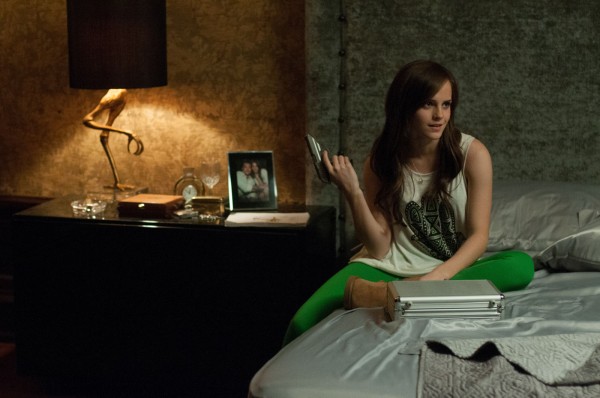
Courtesy of American Zoetrope
You know how it’s a bad idea to read a book and then watch the film adaptation? Well, that doesn’t apply to The Bling Ring because they’re nearly identical texts. I’d congratulate Sofia Coppola on her ability to adapt Nancy Jo Sales’ source, a book length adaptation of Jo Sales’ own Vanity Fair piece “The Suspect Wore Louboutins”, but in this case that’s not a compliment. Why? Because both book and film are terrible.
Perhaps that’s not entirely fair since Coppola’s film is well-shot and well-acted. It’s just dramatically inert. Fault Jo Sales for her journalistic puff piece on celebrity obsessed teens who committed a series of break and entries around Hollywood a few years ago – it’s a story that should have stayed a short article because it lacks substance. The problem is that Coppola doesn’t bring anything new to the table: the film is nothing more than a series of reenactments of robberies, with rich-bitch kids oogling celebrity goodies and little else filling 90 minutes of screen time. The shallowness of the film is its purpose – there’s no rhyme or reason to this madness because there’s nothing more to these kids than their interest in consumer and celebrity culture. But that doesn’t make the film good. It’s literally just a series of repetitive scenes of these morons doing stupid things and talking like extras in Clueless. Even more problematically, Coppola has no insight or commentary to contribute; in fact there’s little authorial direction besides a subtle smug satisfaction in capturing the vapid interests of the current generation.
Let me save you: The Bling Ring is nothing more than 90 minutes of how stupid teens supposedly are. Don’t waste your time on this one.
BEST
TVAngie
#5: The Book Thief (Percival, 2013)
#4: Gravity (Cuarón, 2013)
#3: The Act of Killing (Oppenheimer, Anonymous & Cynn, 2012)
The Act of Killing has got to be one of the most interesting documentaries I’ve ever seen in my life. The film focuses on Anwar Congo and his accomplice Herman Koto as they go through several bizarre reenactments of the government-sanctioned murders they committed in the 1960s. Congo and Koto proudly admit to killing countless suspected Communists in Indonesia, but their desire to dramatize the killings through increasingly outlandish scenarios leaves you captivated from beginning to end. Literally, every genre seems to be represented here – from an over-the-top musical number to classical gangster interrogation scenes. I can’t say that I entirely understand why Congo and Koto decide to reenact their mass murders in such a way, but I can guarantee you it’s absolutely fascinating to watch.
There are traditional talking head interviews throughout, and although it’s predictable that we get glimpses of remorse in the otherwise proud killers, after witnessing the extravagant reenactments, the quiet and honest moments of truth really pack a punch.
Whereas other films may desire to ‘make you think’, The Act of Killing does this in spades and is sure to keep you talking about it well after you’ve watched it. It left quite the impression on me and for that it deserves a slot on my best list this year.
cinephilactic
#5: Kon Tiki (Rønning & Sandberg, 2012)
#4: Jagten / The Hunt (Vinterberg, 2012)
#3: Spring Breakers (Korine, 2013)
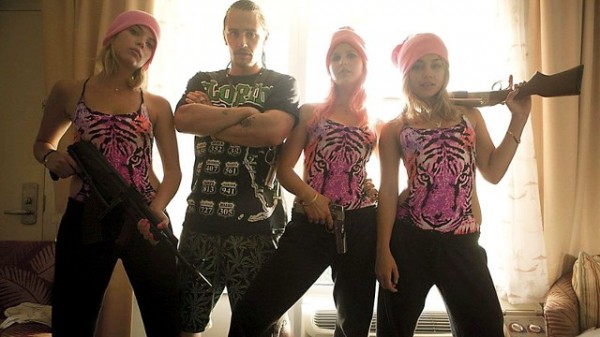
Courtesy of Muse Productions
If the girls of Harmony Korine’s Spring Breakers ran into the girls of Sofia Coppola’s The Bling Ring, they would probably just shoot them. That’s how things roll in Korine’s most publicly accessible film to date (confession: this is the only one I’ve seen). The plot is simple: Spring Breakers is the tale of four trouble loving girlfriends who will do anything to spend spring break in Florida. The real trouble begins when they party too hard, get busted by the cops and end up getting bailed out by a shady drug/gun dealer named Alien (James Franco).
The film gained a great amount of notoriety upon release because it features “mature” performances by teen starlets Vanessa Hudgens and Selena Gomez. This mostly translates into “wearing a bikini” for Gomez, while Hudgens takes things to the extreme a little more. Make no mistake, however, this isn’t so much a sexually provocative film as it is a “teens in danger/dangerous teens” film – the R rating is for violence and language, of which there is plenty.
The simple truth is that the plot and the girls are secondary. If the names on the poster are important to you, then the film belongs to Franco who delivers a compellingly bizarro-weird performance as the girl’s devil and angel. If we’re being honest, though, the real star is Korine and his stylized approach to filmmaking (Side Note: directorial style is a trend you’ll see through my remaining films up to and including my #1 pick on Friday). Spring Breakers is a neon nightmare: a dirty, sweaty environment full of unsavoury characters that we frenetically move through courtesy of Korine’s hyper, music-video style editing. He’s obsessed with repetition as we constantly revisit lines of dialogue and scenes, a tactic that often shifts the original context or hammers home the film’s message. Ironically the message is much the same as The Bling Ring: the girls are shallow and vapid, doling out violent acts in a drug-induced parody of the American dream (grab a gun and make your desires happen!). There’s an unreality to the proceedings, a dream-like hallucinatory effect that makes the candy coloured violence artificial and yet somehow startlingly real at the same time. By the time the climax arrives and the remaining girls are balacava-clad avenging angels raining bullets on Alien’s adversaries, it’s hard not to be swept up in the sheer spectacle and insanity.
*Bonus points for Franco and the girls’ piano rendition of Britney Spear’s Anytime, an instant highlight of the film.
—-
We’ve reached the halfway point for the best and worst of 2013’s films. What do you think of our picks so far? Chime in with your thoughts in the comments section. We’ll be back tomorrow to reveal which films made #2 on our lists, so be sure to check back in!
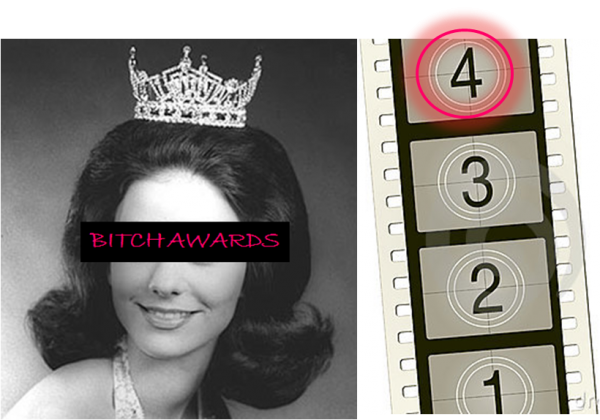
Welcome to the third annual Bitch Awards, celebrating the best and worst of film and TV for the year. Stick around for the next two weeks as we raise a glass to our favourite works from 2013 (and duck as we unceremoniously throw the remote at our least favourites).
We’ve reached #4 on our list of best of the best and worst of the worst films of 2013…
WORST
TVAngie
#5: The World’s End (Wright, 2013)
#4: Upstream Color (Carruth, 2013)
If you like confusing films that border on pretentious, then look no further than Upstream Color. After Shane Carruth’s brilliant first film Primer, I was excited to see what his next offering (nearly a decade later) would produce. To say I was disappointed is putting it mildly. Providing a plot summary is difficult (and pointless since none of it makes any kind of logical sense), but let’s just say it involves pigs, orchids, hallucinogens and inflated, flowery metaphors about the meaning of life.
The film doesn’t end up on my worst list because it opts for a more ‘experimental’ mode of storytelling. It’s here because, quite frankly, I found it boring. Upstream Colour was the most tedious 96 minutes of my life, emulating the worst sense of the word ‘artsy’.
I can live with ambiguity and open-ended plotlines so long as there’s some kind of hook; some element to keep me intrigued and engaged. Alas, Upstream Color comes off as self-indulgent, opting for a ‘transcendental’ experience and thus denying the audience any kind of satisfaction. I despise films like this. It feels as though Carruth is saying ‘If you want to understand me – you need to work for it. And if you don’t then you’re simply not worthy.”
I’m aware that this film has landed on many best lists this year, but I proudly go against the grain and proclaim that it’s a tiresome film and not worth your time.
cinephilactic
#5: Hansel & Gretel: Witch Hunters (Wirkola, 2013) / G.I. Joe: Retaliation (Chu, 2013)
#4 Elysium (Blomkamp, 2013)
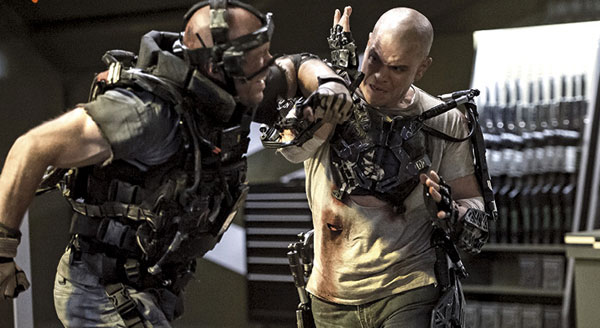
Courtesy of TriStar Pictures
I feel no shame in admitting the fact that I’m a big nerd. I love science fiction and I particularly love dystopias. Having been blown away by Neill Blomkamp’s District 9 (2009), my expectations going into his follow-up were high (admittedly this is often problematic). I had good reason to be excited: the new film had Matt Damon in an exoskeleton suit, Jodie Foster speaking French and District 9 star Sharlto Copley as a bounty hunter. What could go wrong?
Everything, it turns out. Damon’s Max is a bland, boring protagonist who fails to pull audiences into the story. Foster is ruthless, but her motivations are paint-by-numbers and she’s given very little screentime and even less to do. Worst of all is Copley, who basically just shouts and kills indiscriminately; it’s a role that could have been played by anyone as Kruger is nothing more than a generic villain. He’s meant to be a brutal antagonist, but he’s just a cardboard baddie – a hurdle that Max inevitably has to dispose of to achieve the film’s predictable outcome. Throw in a sick child, an impossible “love” story and a anvil-over-the-head obvious allegory about the divide between the rich and poor and Elysium is a predictably obvious, forgettable big budget waste of time. The fact that it’s from one of the most interesting directors working in the genre is a huge disappointment, which is why it’s #4 on my ‘Worst” list for 2013.
See my original review here.
BEST
TVAngie
#5: The Book Thief (Percival, 2013)
#4: Gravity (Cuarón, 2013)
Gravity is one of those films that’s difficult to talk about because so much of my enjoyment of it came from the experience of it. I saw it in a packed theater while sitting in a ‘simulator’ seat that vibrated and moved to further enhance the visuals on screen (which were in 3D no less!). Initially, I thought the technology would be gimmicky, but in a film like Gravity, it was really something amazing. I felt like I was actually in space being bumped around and nudged just like Sandra Bullock. It was a completely immersive experience, producing all kinds of visceral reactions.
In terms of story, the film is very simple. Bullock plays Ryan Stone who experiences a meteor shower in outer space and has to some how get back to Earth. Bullock’s performance is excellent and so is George Clooney in a supporting role, mostly because neither of them detract from the real impact of the film – its visuals. Gravity’s power lies in its creation of atmosphere and its simplicity; There’s nothing unnecessary cluttering up the screen so audiences can completely get lost in the film. Cuarón’s tact as a director is right at the forefront. His extended long continuous shots are perfectly employed, allowing us to marvel at the outer space he’s created and enhancing the harrowing tension when danger is imminent.
I doubt I would have liked the film as much had I seen it at home, without the clarity of the big screen images or the flashy vibrating seats. But at the end of the day, I left the theater feeling as though I had experienced a completely satisfactory cinematic adventure and for that, Gravity deserves a place on my best list this year. If you can still catch it in a theater, I highly recommend it.
Check out cinephilactic’s review of the film here.
cinephilactic
#5: Kon Tiki (Rønning & Sandberg, 2012)
#4 Jagten / The Hunt (Vinterberg, 2012)
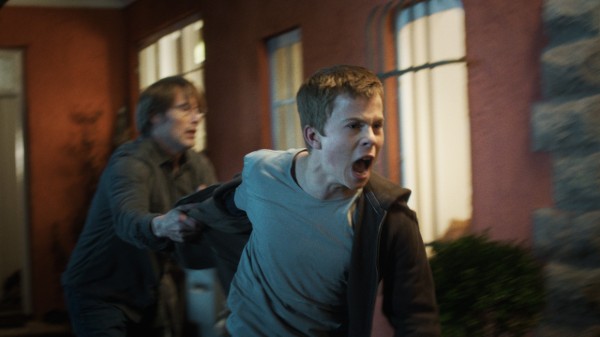
Courtesy of Danmarks Radio (DR)
The Hunt is one of those little seen gems that worms its way into your brain and sticks around for days. It’s the story of Lucas (a superb Mads Mikkelsen), a single father going through a divorce who works as the only male employee at a kindergarten. Things almost immediately get messy when Klara (Annika Wedderkopp), the young daughter of his best friend, accuses Lucas of inappropriate behaviour after he rejects her romantic advances. Unwilling the dismiss the claims, the burden of guilt falls on Lucas, who goes from pillar of the community to disturbed criminal in the space of a few hours. The remainder of the film chronicles Lucas’ fall from grace as he is ostracized, physically attacked and loses all of his friends.
Although the story is relatively straight-forward, the emotional wallop it packs is anything but. At its center is Mikkelsen, who is amazing in the lead role. His performance runs the gamut from confusion to frustration to outrage as his reputation is destroyed on circumstantial evidence. As a viewer, developments are often agonizing to watch because we know that Lucas is innocent, but as The Hunt demonstrates there’s a terrible societal fear of the relationships between children and adults that cannot easily be put aside. Director Vinterberg refuses to give into our desire to see Lucas exonerated in a quick and simple fashion, frequently creating dramatic tension in gorgeously framed tight shots that reinforce how trapped Lucas is.
The film is bookended by two scenes that give the film its name and challenge us to consider the relationship between freedom and community and the ending reveals a deep rooted tension marked by ambivalence that is discomforting – the perfect way to end a film that refuses to simplify an uncomfortable subject. The Hunt is a superbly crafted film anchored by yet another amazing performance by Mikkelsen that challenges us to consider how easily we’ll turn on each other. It’s not always easy to watch, but it is incredibly engrossing and emotional. It’s easily one of the best films I saw this year.
So readers, what do you think of our #4 picks: agree/disagree? Hit up the comments and let us know and be sure to visit us tomorrow as we continue the countdown!
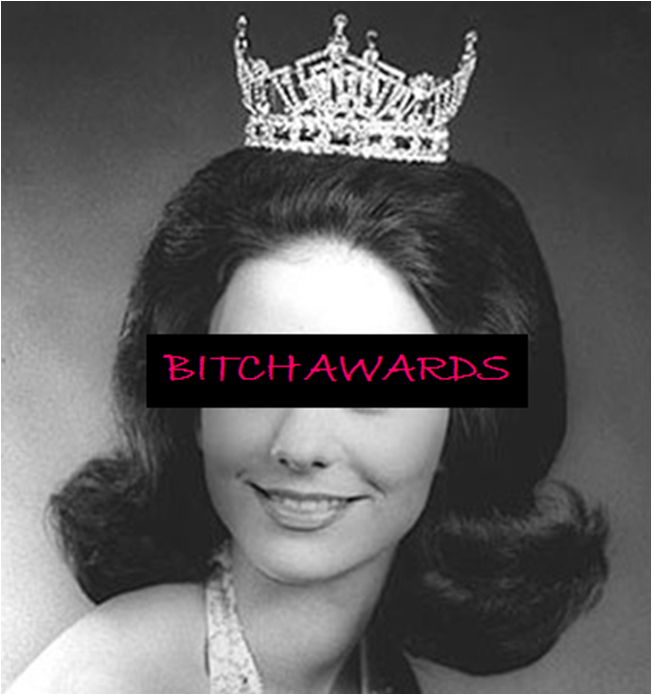
Welcome to the third annual Bitch Awards, celebrating the best and worst in film and TV for the year. Stick around for the next two weeks as we raise a glass to our favourite works from 2013 (and duck as we unceremoniously throw the remote at our least favourites).
Click through for our #5 pick for best and worst films… [Read more…]